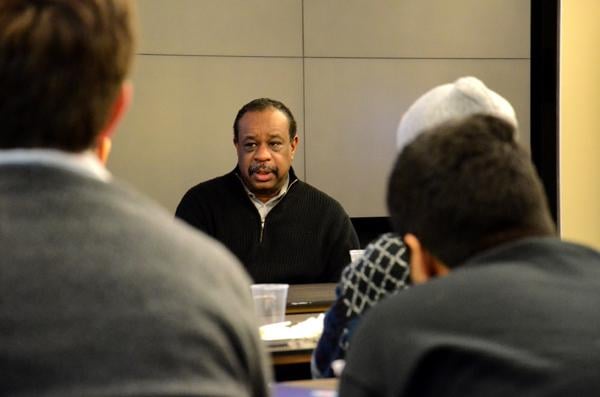Panel talks about support options for minority students

Annabel Edwards/Daily Senior Staffer
Henry Perkins, a psychologist at CAPS, speaks about support services for minority students Monday evening at a panel in Annenberg Hall. The panel also featured representatives from CARE and the department of Religious Life.
March 3, 2014
A panel held on Monday night discussed different ways the Division of Student Affairs supports minority students at Northwestern.
Henry Perkins, coordinator of the Stress Management Clinic at Counseling and Psychological Services; Jackie Marquez, associate University chaplain, and Communication senior Kyra Jones, who works in the Center for Awareness, Response and Education spoke to about 30 students in Annenberg Hall.
The panel was organized by Promote 360, a student group in the School of Education and Social Policy focused on minority empowerment in higher education. The panelists discussed their organizations’ current programs for minority students and ways in which they can improve their support.
SESP junior Karen Wilber planned and moderated the event. She said it was important for students to learn about the different programs that are available.
“Minority issues is obviously a big thing on campus, and we wanted to give some face-to-face time with people that are actually doing something to help minority students,” she said after the event. “I think it was important to hear from people who are doing the work instead of maybe hearing from their website.”
All of the panelists talked about the different partnerships they have with minority student organizations. Perkins brought up CAPS’ “Let’s Talk” initiative, which is a new drop-in consultation program held at both the International Office and the Multicultural Center.
(CAPS targets multicultural students with new drop-in program)
Marquez said she holds office hours once a week at the Black House and the Multicultural Center. Jones added CARE has done a lot of collaboration with the Black House and with black fraternities and sororities.
Jones said as part of a research project, she found 21 percent of the people who use CARE are black, while only 5 percent of NU students are black, she said.
“It’s kind of a startling statistic,” she said. “We’re not quite sure what it comes from, especially because CARE is so new.”
As a result, Jones said, CARE is starting a task force in collaboration with African American Student Affairs next year to find out the root causes behind the gap. She said CARE recently applied for a grant to add a male staff member who would serve as the coordinator of men’s engagement. Jones said the CARE advocates hope if the grant is approved, a man of color will be hired to fill the position.
Marquez said one of her goals is to plan retreats for groups of students. She said retreats are a way to “create small spaces for students to breathe.”
“I think students are really looking for, whether they can name it or not, opportunities to stop, reflect, be heard and listen,” she said. “If we could do that for 24 hours together, I think students can get a lot out of it.”
During a question and answer session, an attendee asked how a white student could support other minority students. Perkins said listening is the most effective way to show support.
“We live in an increasingly complex and integrated, if you will, culture and society where notions of inclusions won’t be just spoken, but will kind of be the reality,” Perkins said. “It’s been my experience that having an intention of having an open heart and an open mind, a willingness to listen and be impacted by what you’ve heard goes a long way.”
Communication freshman Xiomara Contreras said she attended the event because she wanted to hear about NU’s support programs in a more intimate setting. She said the first time she was exposed to the programs was during Wildcat Welcome. She was also interested in learning more about opportunities for minority students.
“I didn’t know a lot about CARE, so that was really nice to hear that they had drop-ins at the Black House,” she said. “CAPS, I think, is one of those things that people have a lot of questions about because it’s so hard to access. I think it was helpful to hear that they are trying to do more.”
Email: [email protected]
Twitter: @tylerpager

